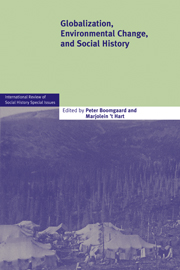Book contents
- Frontmatter
- Contents
- Notes on Contributors
- Globalization, Environmental Change, and Social History: An Introduction
- The El Dorado of Forestry: The Eucalyptus in India, South Africa, and Thailand, 1850–2000
- The Mid-Atlantic Islands: A Theatre of Early Modern Ecocide?
- Environmental Change and Globalization in Seventeenth-Century France: Dutch Traders and the Draining of French Wetlands (Arles, Petit Poitou)
- The Colonial Famine Plot: Slavery, Free Trade, and Empire in the French Atlantic, 1763–1791
- Environmental Changes, the Emergence of a Fuel Market, and the Working Conditions of Salt Makers in Bengal, c. 1780–1845
- Industrial Life in a Limiting Landscape: An Environmental Interpretation of Stalinist Social Conditions in the Far North
- “Pumpkins Just Got in There”: Gender and Generational Conflict and “Improved” Agriculture in Colonial Zimbabwe
- Hydro-businesses: National and Global Demands on the São Francisco River Basin Environment of Brazil
- Bibliography
Industrial Life in a Limiting Landscape: An Environmental Interpretation of Stalinist Social Conditions in the Far North
Published online by Cambridge University Press: 05 June 2012
- Frontmatter
- Contents
- Notes on Contributors
- Globalization, Environmental Change, and Social History: An Introduction
- The El Dorado of Forestry: The Eucalyptus in India, South Africa, and Thailand, 1850–2000
- The Mid-Atlantic Islands: A Theatre of Early Modern Ecocide?
- Environmental Change and Globalization in Seventeenth-Century France: Dutch Traders and the Draining of French Wetlands (Arles, Petit Poitou)
- The Colonial Famine Plot: Slavery, Free Trade, and Empire in the French Atlantic, 1763–1791
- Environmental Changes, the Emergence of a Fuel Market, and the Working Conditions of Salt Makers in Bengal, c. 1780–1845
- Industrial Life in a Limiting Landscape: An Environmental Interpretation of Stalinist Social Conditions in the Far North
- “Pumpkins Just Got in There”: Gender and Generational Conflict and “Improved” Agriculture in Colonial Zimbabwe
- Hydro-businesses: National and Global Demands on the São Francisco River Basin Environment of Brazil
- Bibliography
Summary
Summary: This paper offers an environmental history of a group of forced migrants who were sent to work on a Soviet industrial project in the far north during the 1930s. As part of the drive to industrialize the country rapidly, the Soviet state deported thousands of peasants who had been declared class enemies to the previously desolate Khibiny Mountains in order to serve as the labor force for a new socialist mining town. These forced migrants became known as “special settlers”. I argue that the integration of the environment as a dynamic force in the social history of Stalinism enriches current explanations for why the Soviet state was often unable to carry out its intentions during industrialization. I also maintain that through the pursuit of the global process of industrialization, the Soviet government contributed to making the special settlers in the Khibiny Mountains vulnerable to natural hazards.
After what she recalled was a happy childhood in a village in the Krasnodar region, L.E. Gudovskaia's life changed abruptly on a February night in 1930. Police came and arrested her father, E.A. Zinchenko, as a kulak – a comparatively well-off peasant deemed a class enemy by the Soviet state. Stripped of their property, the entire family was sent to the Urals region and forced to collect wood from the surrounding forests. At the end of the summer the government again relocated the family.
- Type
- Chapter
- Information
- Globalization, Environmental Change, and Social History , pp. 153 - 174Publisher: Cambridge University PressPrint publication year: 2011



